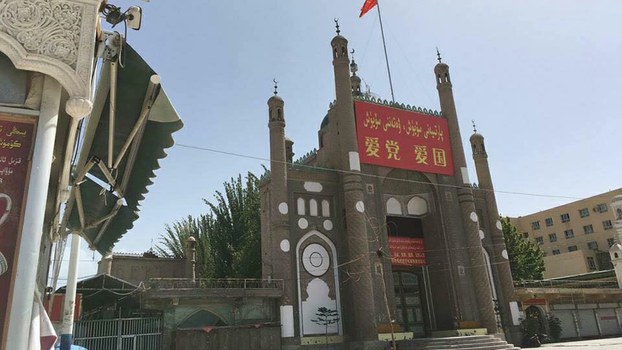Authorities in northwest China’s Xinjiang region are forbidding practice by ethnic Uyghurs of the daily prayers required of observant Muslims, allowing only those 65 years of age and older to fulfill their religious obligations, sources say.
The move further tightens restrictions on Islamic practice that has already seen restrictions placed on the annual Ramadan fast and the banning of religious instruction for Uyghur children under 18, who are also barred from entering mosques.
Enacted in 2017, the ban on the daily prayer called namaz has been reported in three separate jurisdictions in the Xinjiang Uyghur Autonomous Region (XUAR), and is being enforced by village police officers who enter private homes to command compliance, sources said.
Those found in violation of the rules are reported to local authorities and face penalties including possible incarceration in Xinjiang’s network of political re-education camps, where as many as 1.8 million ethnic Uyghurs and other Turkic Muslims accused of “religious extremism” and of harboring “politically incorrect ideas” have been held since 2017.
Uyghur households examined by police are told that only older men can now go to the mosques to pray, a village police officer in Atush city told RFA’s Uyghur Service, adding that officers visiting the homes “of course” recommend to all others that they abandon their prayers.
“We don’t do things like let younger people into the mosques,” she said. “But it’s fine if they’re 65 or older.”
Officers enforcing the ban introduce themselves to Uyghur families as representatives of the mosque administrative committees, the officer said, adding, “We tell them not to take part in any religious activities, and just to live in peace.”
Faced with strict orders from the police, people willingly go along with the new restrictions, she said. “This is the government’s work.”
Turned over to enforcers
A second police officer in Atush confirmed that it has been a part of his job since 2017 to watch for Uyghurs performing namaz or other religious activities, saying that if someone is found to have broken the law, they are handed over to local enforcement groups.
“We tell the offenders that they have violated the law, and we turn them over to the village brigade,” he said “The village brigade takes them for re-education, and we then inform their family about what happened. That’s how it goes.”
Reached for comment, a Religious Affairs Committee worker in Turpan prefecture declined to answer a reporter’s questions, saying, “Well, in this case you need to come to our office rather than talking about this on the phone.”
But a member of a “work group” in Xinjiang’s Kizilsu Kirghiz Autonomous Prefecture confirmed that before the new regulation went into effect in 2017, only Communist Party members and children under the age of 18 were forbidden to pray.
“[Now], we tell people that they have to be part of the work of eliminating religious extremism and terrorism and promoting stability — that we all must work toward the safety and security of our region.”
“For the sake of all of us, we’re ruling the country by law, controlling the country by law,” he said.

